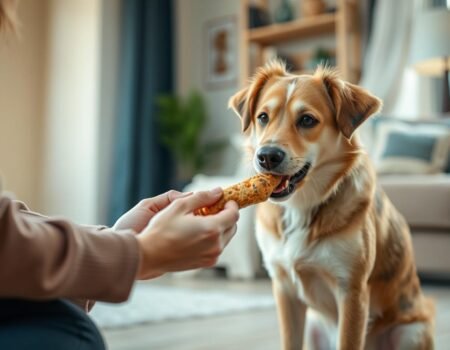Did you know that peanuts are one of the most common allergens for humans? But what about our furry friends? Can dogs eat peanuts safely? While peanuts may seem like a harmless snack, there are risks associated with feeding peanuts to dogs. In this article, we will explore the potential dangers of peanuts for dogs, including peanut allergies and other health concerns. We will also provide tips on alternative treats and safe peanut butter options for your beloved canine companion.
Key Takeaways:
- Feeding peanuts to dogs can pose risks due to potential allergies and the presence of toxins.
- Peanuts may contain lectins and aflatoxins, which can cause digestive issues and liver damage in dogs.
- Some dogs may be allergic to peanuts, resulting in symptoms such as vomiting, diarrhea, and itching.
- It is best to avoid feeding peanuts or peanut butter to dogs and opt for safer and healthier treats.
- Consult with your veterinarian for guidance on the appropriate diet for your dog and suitable peanut butter options.
Reasons to Avoid Peanut Butter and Peanuts for Dogs
Feeding peanut butter and peanuts to dogs can pose several risks and potential hazards. Here are five key reasons why it’s best to steer clear of these nutty treats:
- Peanuts contain lectins, which can cause immune responses and increase inflammation in joints and organs. This can lead to discomfort and potentially serious health issues for your furry friend.
- Peanuts may contain aflatoxins, toxic substances linked to liver cancer in dogs. These harmful compounds can have severe long-term effects on your dog’s health.
- Peanut butter can contain oxidized fats, which can trigger inflammation in the body. This can result in digestive problems, allergies, and other adverse reactions.
- Peanuts are calorie-dense, which means that excessive consumption can contribute to weight gain and obesity in dogs. Just a handful of peanuts can significantly impact their calorie intake.
- Peanut butter often contains additives and sweeteners that can be harmful to dogs. Xylitol, a common sweetener in many peanut butter brands, is particularly toxic to dogs and can cause severe health complications.
Considering these risks, it’s highly recommended to avoid feeding your dog peanuts or peanut butter altogether. Instead, opt for safer and healthier treat alternatives.
Nutritional Benefits of Peanuts for Dogs
While there are risks associated with feeding peanuts to dogs, they do offer some nutritional benefits. Peanuts are high in protein and healthy fats, which can contribute to a well-balanced diet for dogs. They also contain vitamins and minerals that are beneficial for their overall health. However, it is important to note that peanuts should only be given to dogs in moderation and as part of a balanced diet.
| Nutritional Benefits of Peanuts for Dogs | Amount per Serving (28g) |
|---|---|
| Protein | 7g |
| Fat | 14g |
| Vitamin E | 2.4mg |
| Niacin (Vitamin B3) | 4mg |
| Magnesium | 50mg |
Peanuts can be a good source of protein for dogs, supporting muscle development and repair. The healthy fats found in peanuts can contribute to a shiny coat and healthy skin. Additionally, peanuts contain vitamin E, which acts as an antioxidant and helps protect cells from damage. Niacin, another vitamin found in peanuts, aids in proper digestion and energy production. Lastly, magnesium is important for maintaining strong bones and nerve function in dogs.
Despite these nutritional benefits, it is crucial to remember that peanuts should be given to dogs in moderation. Consuming peanuts in large quantities may lead to weight gain and potential digestive issues. Always consult with your veterinarian to determine the appropriate portion size for your dog based on their size, weight, and overall health.
The Importance of Moderation
The key to incorporating peanuts into your dog’s diet is moderation. While they do offer nutritional benefits, it is essential to avoid excessive consumption. Treat peanuts as an occasional addition to your dog’s diet, rather than a staple. Balance is key to maintaining your dog’s overall health and well-being.
Peanut Allergies and Sensitivities in Dogs
Peanut allergies are rare in dogs, but they can occur. Just like humans, dogs can develop sensitivities or allergies to certain foods, including peanuts. If your dog has a peanut allergy, it means their immune system reacts negatively to the proteins found in peanuts.
Dogs with peanut allergies may experience a range of symptoms, including:
- Vomiting
- Diarrhea
- Itching
- Difficulty breathing
If you notice any of these signs after your dog consumes peanuts, it is essential to avoid feeding them peanuts in the future. Allergic reactions can vary in severity, so it’s crucial to prioritize your dog’s health and well-being.
If you suspect that your dog has a peanut allergy, it is best to consult with your veterinarian for a proper diagnosis and guidance. They can perform tests and recommend suitable treatment or dietary adjustments to manage your dog’s peanut allergy effectively.
Feeding Guidelines for Dogs
When it comes to feeding peanuts or any other nuts to dogs, we need to exercise caution and feed them in moderation. Peanuts should be considered as an occasional treat rather than a regular part of their diet. It is crucial to take into account the size and weight of your dog when determining the appropriate amount of peanuts to give. Consulting with your veterinarian can provide you with specific feeding guidelines tailored to your dog’s individual needs.
Feeding guidelines:
- Consider moderation: Peanuts should only be given as an occasional treat.
- Portion control: The appropriate amount of peanuts can vary based on the size and weight of your dog. Avoid overfeeding.
- Consult with your veterinarian: Your veterinarian can provide specific feeding guidelines based on your dog’s individual needs, considering factors such as breed, age, and overall health.
Remember, while peanuts do offer some nutritional benefits, it is important to avoid excessive consumption and be aware of the potential risks. Following these feeding guidelines ensures that your furry friend can enjoy peanuts safely as a special treat without compromising their health.
Quote:
“Feeding peanuts in moderation, considering your dog’s size and consulting with your veterinarian are essential to ensure their safety and well-being.”
Peanut Butter as a Dog Treat
While peanuts are generally not recommended for dogs, some dog-friendly peanut butter options may be suitable as an occasional treat for your furry friend. Peanut butter is a popular choice among dog owners, as it is flavorful and can be used in various ways to entertain and reward your dog.
When choosing peanut butter for your dog, it is crucial to select a product that is safe and healthy. Here are a few things to consider:
- Look for peanut butter that does not contain any harmful additives, such as xylitol or excessive salt.
- Opt for peanut butter that is made specifically for dogs, as it is often formulated to meet their nutritional needs.
- If you decide to use regular peanut butter, make sure it is plain and does not contain any added ingredients like sugar, salt, or chocolate.
Introduce peanut butter as a treat gradually to monitor your dog for any adverse reactions. Start with a small amount and observe if there are any signs of digestive upset or allergic reactions.
Remember, peanut butter should still be given in moderation, and you should consider your dog’s overall diet and health. While it can be a tasty and rewarding treat, it should not replace a complete and balanced diet.
We recommend the following guidelines when using peanut butter as a dog treat:
- Use peanut butter sparingly – it should be an occasional indulgence rather than a daily snack.
- A small spoonful or a smear inside a treat-dispensing toy can provide mental stimulation and entertainment.
- Consider freezing plain peanut butter in a Kong toy for a longer-lasting treat that keeps your dog engaged.
Here’s an example of a simple table comparing different dog-friendly peanut butter options:
| Peanut Butter Brand | Main Ingredients | Additives | Price |
|---|---|---|---|
| Pup’s Choice | 100% peanuts | No additives | $10.99 |
| Tail Waggers | Roasted peanuts, vegetable oil | No salt | $8.99 |
| Healthy Paws | Organic peanuts, flaxseed oil | No artificial sweeteners | $12.99 |
“Giving your dog peanut butter can be a fun and rewarding experience for both you and your furry friend. Just ensure you choose a dog-friendly option that aligns with their dietary needs and preferences. Remember, moderation is key, and always prioritize their well-being.”
Alternatives to Peanuts for Dogs
When it comes to treating our furry friends, we want to ensure their safety and well-being. While peanuts may not be the best choice for dogs, there are plenty of other delicious and healthy alternatives that you can offer them. These alternatives are not only safe for dogs but also provide a range of nutritional benefits. Let’s explore some of the top alternatives to peanuts for dogs:
- Carrots: Carrots are a crunchy and low-calorie treat that dogs love. They are packed with vitamins and minerals, including beta-carotene, which is great for their eye health.
- Apples: Apples are a tasty and nutritious fruit that can be given to dogs in moderation. They are a good source of fiber, vitamin C, and antioxidants.
- Blueberries: Blueberries are a superfood for dogs. They are rich in antioxidants, vitamins, and fiber. Plus, they make a delicious and refreshing treat.
- Pumpkin: Pumpkin is not only flavorful but also highly nutritious for dogs. It is low in calories and high in fiber, which aids in digestion. It can be served raw or cooked.
These alternatives are excellent alternatives to peanuts and can be incorporated into your dog’s diet as treats or added to their meals for an extra nutritional boost. Always remember to introduce new foods gradually and monitor your dog for any adverse reactions.
Remember, our furry friends deserve the best when it comes to their nutrition. So, let’s make sure we provide them with safe and healthy options that not only satisfy their taste buds but also contribute to their overall well-being.
Commercial Peanut Products for Dogs
When it comes to catering to our furry friends‘ love for peanut flavor, there are several commercial peanut products available exclusively for dogs. These products are specially formulated to ensure their safety and enhance their overall health. Let’s take a closer look at some of these commercial peanut products that can be a delightful treat for our canine companions.
Peanut Butter-Flavored Biscuits
If your dog is a fan of peanut butter but you want to avoid the risks associated with traditional peanut butter, peanut butter-flavored biscuits are a fantastic alternative. These biscuits offer the delicious taste of peanut butter without the potential harmful additives or excessive salt. They are designed to be both tasty and nutritious, giving your dog a satisfying treat without compromising their well-being.
Peanut Butter Chews
Another popular commercial peanut product for dogs is peanut butter chews. These chews provide a longer-lasting chewing experience while adding the scrumptious taste of peanut butter. They are made with high-quality ingredients and free from harmful additives, ensuring your dog enjoys a safe and healthy chewing activity.
Peanut Supplements
Aside from biscuits and chews, peanut supplements are also available for dogs. These supplements are typically packed with nutrients beneficial for your dog’s health, such as essential fatty acids and vitamins. They can be a great addition to your dog’s diet, providing them with the goodness of peanuts along with other essential nutrients.
It’s crucial to choose commercial peanut products for dogs that are made with high-quality ingredients and free from harmful additives. Always read the labels to ensure that there are no potential allergens or ingredients that may be harmful to your furry friend. By opting for these specially designed treats, you can indulge your dog’s peanut cravings while prioritizing their health and well-being.
Potential Side Effects of Peanuts in Dogs
While peanuts can generally be safe for most dogs, it’s important to be aware of the potential side effects they can cause. Dogs with a peanut allergy may experience allergic reactions when consuming peanuts, which can include gastrointestinal upset, itching, and difficulty breathing. These symptoms can range from mild to severe and may require immediate veterinary attention.
In addition to allergies, peanuts can also contribute to pancreatitis in dogs, particularly if consumed in large quantities or if the dog has a pre-existing condition. Pancreatitis is a condition characterized by inflammation of the pancreas and can cause symptoms such as vomiting, abdominal pain, and loss of appetite. If you notice any of these signs or suspect that your dog may be experiencing pancreatitis, it’s crucial to seek veterinary care.
Symptoms of Peanut Allergies in Dogs:
- Gastrointestinal upset
- Itching
- Difficulty breathing
To ensure the well-being of your furry friend, it’s essential to monitor their reactions after consuming peanuts and consult with your veterinarian if you have any concerns. They can provide guidance on whether peanuts are suitable for your dog and recommend an appropriate diet and treatment plan if necessary.
Remember, every dog is unique, and their tolerance and reaction to peanuts may vary. It’s always best to prioritize your dog’s health and well-being, so if you have any doubts or questions regarding peanut consumption, consult with a veterinary professional.
We must be cautious when feeding our four-legged friends any foods that may have potential side effects. In the next section, we’ll dive deeper into the question of whether dogs can eat peanut butter, a popular treat among dog owners.
Can Dogs Eat Peanut Butter?
While peanuts themselves may not be recommended for dogs, peanut butter is a popular treat among dog owners. However, it is important to choose peanut butter that is specifically made for dogs or opt for plain peanut butter with no harmful additives.
Avoid peanut butter that contains xylitol, a sweetener that is toxic to dogs. Peanut butter should still be given in moderation and as an occasional treat, taking into consideration your dog’s overall diet and health.
Pepper, our furry friends can enjoy the occasional taste of peanut butter as long as it meets certain criteria. The peanut butter should be free from any artificial sweeteners, especially xylitol, which can be highly toxic to dogs. Opt for natural or organic peanut butter that contains only peanuts or peanuts and salt.
Here are a few things to consider when feeding your dog peanut butter:
- Read the ingredient label carefully. Make sure the peanut butter does not contain xylitol, which can cause a sudden drop in your dog’s blood sugar levels and can be life-threatening.
- Choose peanut butter with limited ingredients, preferably only peanuts or peanuts and salt. Avoid products that contain additives, preservatives, or excessive amounts of salt.
“Giving your dog a small amount of peanut butter as an occasional treat can be a fun and enjoyable experience for both of you,” says Dr. Amanda Rogers, a veterinarian at Woof & Whiskers Veterinary Clinic. However, keep in mind that peanut butter is high in fat and calories, so consuming large amounts regularly can contribute to weight gain in dogs.
A well-balanced diet is crucial for the overall health and well-being of our canine companions. While peanut butter can be a tasty treat, it should never replace a nutritious and balanced meal.
“When feeding peanut butter to your dog, moderation is key,” advises Dr. Rogers. “Offer small amounts and be mindful of your dog’s weight and overall health. If you have any concerns or questions, consult with your veterinarian.”
Peanut Butter as a Training Aid
In addition to being a delicious treat, peanut butter can also serve as a useful training aid for dogs. Its rich and creamy texture makes it perfect for stuffing into interactive toys or smearing onto a lick mat. This can help keep your dog mentally stimulated and entertained, especially when you need to distract them or keep them busy for a period of time.
“Peanut butter can provide mental enrichment for dogs and can be a valuable tool during training,” notes Dr. Rogers. “Just make sure to adjust your dog’s daily calorie intake accordingly and avoid overindulging.”
Remember, every dog is different, and what works for one may not work for another. Some dogs may have allergies or sensitivities to peanuts or peanut butter, so it is important to monitor your dog for any adverse reactions after consuming peanut butter.
“If you notice any signs of gastrointestinal upset, itching, or difficulty breathing after your dog eats peanut butter, discontinue use and consult with your veterinarian,” advises Dr. Rogers.
In conclusion, while peanut butter can be a tasty and enjoyable treat for dogs, it is essential to choose a peanut butter that is safe and suitable for canine consumption. Just remember to check the label, avoid harmful additives like xylitol, and feed it to your dog in moderation. With these precautions in mind, you and your furry friend can continue to enjoy the occasional peanut butter indulgence!
Conclusion
In conclusion, it is important to consider the risks associated with feeding peanuts to dogs. While peanuts can offer some nutritional benefits, such as protein and healthy fats, they can also pose potential health risks. Peanut allergies are rare in dogs but can occur, leading to symptoms like vomiting, diarrhea, and difficulty breathing. Additionally, peanuts may contain toxins, such as aflatoxins, which can be harmful to a dog’s liver.
Considering these risks, it is best to consult with your veterinarian before introducing peanuts or peanut products into your dog’s diet. Your vet can provide personalized recommendations and guidance based on your dog’s specific needs and health conditions. It is crucial to prioritize your dog’s well-being and consider alternative, safe, and healthy treats that can provide necessary nutrients without the potential risks.
Remember, there are various dog-friendly treats available, such as carrots, apples, blueberries, and pumpkin, which can serve as tasty and nutritious alternatives to peanuts. By making informed and responsible feeding decisions, you can ensure that your furry companion stays happy, healthy, and free from the potential risks associated with peanuts.
FAQ
Can dogs eat peanuts?
Peanuts are not recommended for dogs due to various risks associated with their consumption.
Are peanuts safe for dogs?
Peanuts are not considered safe for dogs as they can contain lectins and aflatoxins, which can cause digestive issues and liver damage.
Can dogs have peanut allergies?
While peanut allergies are rare in dogs, they can occur and manifest as symptoms such as vomiting, diarrhea, itching, and difficulty breathing.
How much peanuts should I give my dog?
Peanuts should only be given to dogs in moderation as an occasional treat, and the amount should be based on your dog’s size and weight.
What are the risks of feeding peanuts to dogs?
Feeding peanuts to dogs can pose risks such as allergic reactions, inflammation, weight gain, and potential pancreatitis.
Can I give my dog peanut butter instead of peanuts?
While peanut butter can be a popular treat for dogs, it is important to choose dog-friendly options without harmful additives and give it in moderation.
What are some alternatives to peanuts for dogs?
Carrots, apples, blueberries, and pumpkin are safe and healthy alternatives to peanuts for dogs.
Are there any commercial peanut products made specifically for dogs?
Yes, there are commercial peanut products such as peanut butter-flavored biscuits, chews, and supplements designed for dogs.
What are the potential side effects of peanuts in dogs?
Dogs with peanut allergies can experience gastrointestinal upset, itching, and difficulty breathing. Peanuts can also contribute to pancreatitis in dogs.
Can dogs eat peanut butter?
Peanut butter can be given as an occasional treat to dogs but should be chosen carefully, ensuring it contains no harmful additives or xylitol.











No Comment! Be the first one.